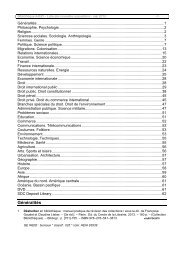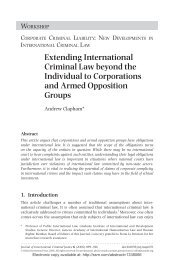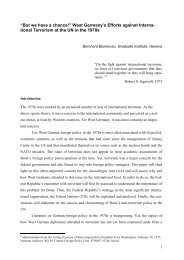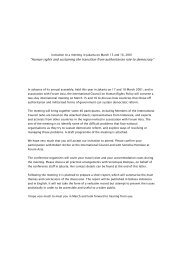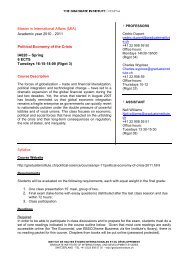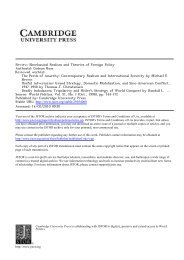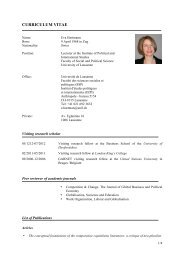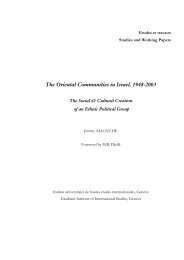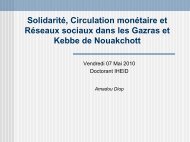Switzerland - The Graduate Institute, Geneva
Switzerland - The Graduate Institute, Geneva
Switzerland - The Graduate Institute, Geneva
You also want an ePaper? Increase the reach of your titles
YUMPU automatically turns print PDFs into web optimized ePapers that Google loves.
Address<br />
WORLD COUNCIL OF CHURCHES, WCC<br />
150 Route de Ferney<br />
P.O. Box 2100<br />
CH-1211 <strong>Geneva</strong> 2<br />
Phone +41 (0)22 791 6111<br />
Fax +41 (0)22 791 0361<br />
Web http://www.oikoumene.org<br />
E-Mail info@wcc-coe.org<br />
Category Dialogue<br />
MISSION STATEMENT<br />
<strong>The</strong> aim of the WCC is to pursue the goal of the visible unity of the Church. <strong>The</strong> World Council of Churches (WCC) is the broadest<br />
and most inclusive among the many organized expressions of the modern ecumenical movement. In particular, the Justice, Peace,<br />
Creation Program (JPO) was created with the aim to analyze and reflect on justice, peace and creation in their interrelatedness, to<br />
promote values and practices that make for a culture of peace, and to work towards a culture of solidarity with young people,<br />
women, Indigenous Peoples and racially and ethnically oppressed people.<br />
Founding year 1948, consultative status with the UN.<br />
BACKGROUND AND ACTIVITIES<br />
<strong>The</strong> WCC is a fellowship of churches, now 348 in more than 120 countries in all continents from virtually all Christian traditions. WCC<br />
programs relate to the Council's five "historic" themes: faith and order; mission and ecumenical formation; justice, peace and<br />
creation; international affairs, peace and human security; and diakonia and solidarity.<br />
<strong>The</strong> Churches Commission on International affairs (CCIA) advise the WCC in international affairs. <strong>The</strong> staff of the WCC International<br />
Affairs, Peace and Human Security team work on peace-making and peaceful resolution of conflicts, militarism, disarmament and<br />
arms control, human security and the root causes of terrorism, human rights, religious liberty and intolerance, impunity, justice and<br />
reconciliation, international law and global governance.<br />
Special Programs:<br />
• Decade to overcome violence 2001-2010: WCC member churches aim at being agents of reconciliation and peace with<br />
justice in homes, churches and societies as well as in the political, social and economic structures at the global level.<br />
• Dialogue with neighbours of other religions: promoting dialogue between Christians and partners of other religious<br />
traditions.<br />
• Ethics of Life and alternatives to globalization: This WCC programme - with staff in <strong>Geneva</strong> and consultants and<br />
seconded staff in the field - co-ordinates efforts to promote justice, peace and the integrity of creation so that all may attain<br />
"fullness of life".<br />
• Ecumenical advocacy and peaceful resolution of conflicts: <strong>The</strong> WCC works to prevent - or if that is impossible, to<br />
resolve peacefully - armed conflicts and wars. Similarly, it works with them to identify and condemn human-rights violations.<br />
It suggests consistent ecumenical approaches to international issues, and offers interpretation of complex issues and advice<br />
on the root causes of war. It works through political analysis and documentation, policy development, advocacy and<br />
solidarity campaigns and awareness-building. A recent example is the Ecumenical Accompaniment Programme in Israel and<br />
Palestine (EAPPI).<br />
• Ecumenical Focus on Africa: In collaboration with NEPAD, it emphasizes overcoming HIV/AIDS, and attaining peace and<br />
reconciliation as urgent priorities; it accompanies churches which are contributing to African peace and reconciliation<br />
movements.



![Download [pdf] - The Graduate Institute, Geneva](https://img.yumpu.com/23370020/1/190x248/download-pdf-the-graduate-institute-geneva.jpg?quality=85)
